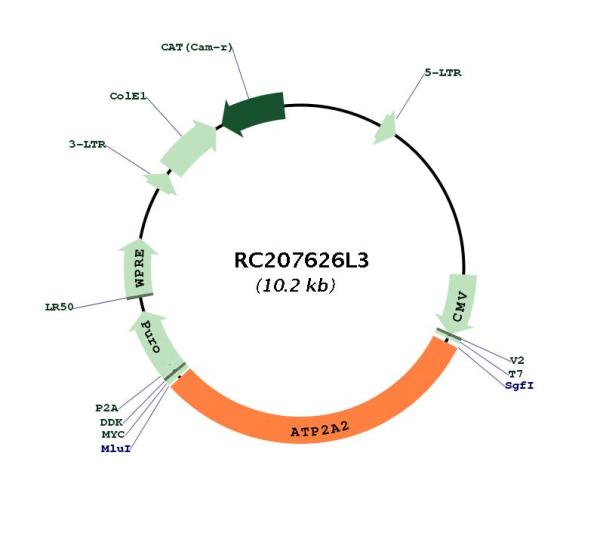SERCA2 (ATP2A2) (NM_170665) Human Tagged Lenti ORF Clone
CAT#: RC207626L3
- LentiORF®
Lenti ORF clone of Human ATPase, Ca++ transporting, cardiac muscle, slow twitch 2 (ATP2A2), transcript variant 1, Myc-DDK-tagged
"NM_170665" in other vectors (6)
Specifications
| Product Data | |
| Type | Human Tagged ORF Clone |
| Tag | Myc-DDK |
| Symbol | SERCA2 |
| Synonyms | ATP2B; DAR; DD; SERCA2 |
| Vector | pLenti-C-Myc-DDK-P2A-Puro |
| E. coli Selection | Chloramphenicol (34 ug/mL) |
| Mammalian Cell Selection | Puromycin |
| Sequence Data |
The ORF insert of this clone is exactly the same as(RC207626).
|
| Restriction Sites |
SgfI-MluI
Cloning Scheme for this gene
Plasmid Map

|
| ACCN | NM_170665 |
| ORF Size | 3126 bp |
| OTI Disclaimer | Due to the inherent nature of this plasmid, standard methods to replicate additional amounts of DNA in E. coli are highly likely to result in mutations and/or rearrangements. Therefore, OriGene does not guarantee the capability to replicate this plasmid DNA. Additional amounts of DNA can be purchased from OriGene with batch-specific, full-sequence verification at a reduced cost. Please contact our customer care team at custsupport@origene.com or by calling 301.340.3188 option 3 for pricing and delivery. The molecular sequence of this clone aligns with the gene accession number as a point of reference only. However, individual transcript sequences of the same gene can differ through naturally occurring variations (e.g. polymorphisms), each with its own valid existence. This clone is substantially in agreement with the reference, but a complete review of all prevailing variants is recommended prior to use. More info |
| OTI Annotation | This clone was engineered to express the complete ORF with an expression tag. Expression varies depending on the nature of the gene. |
| Product Components | The ORF clone is ion-exchange column purified and shipped in a 2D barcoded Matrix tube containing 10ug of transfection-ready, dried plasmid DNA (reconstitute with 100 ul of water). |
| Reconstitution | 1. Centrifuge at 5,000xg for 5min. 2. Carefully open the tube and add 100ul of sterile water to dissolve the DNA. 3. Close the tube and incubate for 10 minutes at room temperature. 4. Briefly vortex the tube and then do a quick spin (less than 5000xg) to concentrate the liquid at the bottom. 5. Store the suspended plasmid at -20°C. The DNA is stable for at least one year from date of shipping when stored at -20°C. |
| Reference Data | |
| RefSeq | NM_170665.2 |
| RefSeq Size | 8329 bp |
| RefSeq ORF | 3129 bp |
| Locus ID | 488 |
| UniProt ID | P16615 |
| Cytogenetics | 12q24.11 |
| Domains | E1-E2_ATPase, Cation_ATPase_N, Hydrolase, Cation_ATPase_C |
| Protein Families | Druggable Genome, Transmembrane |
| Protein Pathways | Alzheimer's disease, Arrhythmogenic right ventricular cardiomyopathy (ARVC), Calcium signaling pathway, Cardiac muscle contraction, Dilated cardiomyopathy, Hypertrophic cardiomyopathy (HCM) |
| MW | 114.8 kDa |
| Gene Summary | This gene encodes one of the SERCA Ca(2+)-ATPases, which are intracellular pumps located in the sarcoplasmic or endoplasmic reticula of the skeletal muscle. This enzyme catalyzes the hydrolysis of ATP coupled with the translocation of calcium from the cytosol into the sarcoplasmic reticulum lumen, and is involved in regulation of the contraction/relaxation cycle. Mutations in this gene cause Darier-White disease, also known as keratosis follicularis, an autosomal dominant skin disorder characterized by loss of adhesion between epidermal cells and abnormal keratinization. Other types of mutations in this gene have been associated with various forms of muscular dystrophies. Alternative splicing results in multiple transcript variants encoding different isoforms. [provided by RefSeq, Dec 2019] |
Documents
| Product Manuals |
| FAQs |
| SDS |
Resources
Other Versions
| SKU | Description | Size | Price |
|---|---|---|---|
| RC207626 | ATP2A2 (Myc-DDK-tagged)-Human ATPase, Ca++ transporting, cardiac muscle, slow twitch 2 (ATP2A2), transcript variant 1 |
USD 1,360.00 |
|
| RC207626L1 | Lenti ORF clone of Human ATPase, Ca++ transporting, cardiac muscle, slow twitch 2 (ATP2A2), transcript variant 1, Myc-DDK-tagged |
USD 1,660.00 |
|
| RC207626L2 | Lenti ORF clone of Human ATPase, Ca++ transporting, cardiac muscle, slow twitch 2 (ATP2A2), transcript variant 1, mGFP tagged |
USD 1,660.00 |
|
| RC207626L4 | Lenti ORF clone of Human ATPase, Ca++ transporting, cardiac muscle, slow twitch 2 (ATP2A2), transcript variant 1, mGFP tagged |
USD 1,660.00 |
|
| RG207626 | ATP2A2 (tGFP-tagged) - Human ATPase, Ca++ transporting, cardiac muscle, slow twitch 2 (ATP2A2), transcript variant 1 |
USD 1,560.00 |
|
| SC101233 | ATP2A2 (untagged)-Human ATPase, Ca++ transporting, cardiac muscle, slow twitch 2 (ATP2A2), transcript variant 1 |
USD 908.00 |
{0} Product Review(s)
Be the first one to submit a review






























































































































































































































































 Germany
Germany
 Japan
Japan
 United Kingdom
United Kingdom
 China
China


